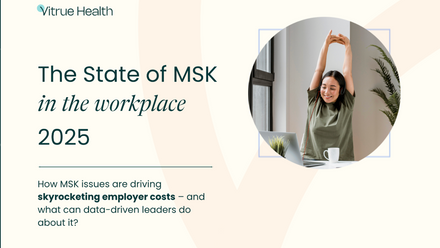The impact of Covid-19 on cancer – what every employer needs to know
In fact, closing the care gap is the focus of this year's World Cancer Day on Friday 4th February. Arguably however, the single shared inequality which all people living with cancer have been equally impacted by during the pandemic, is their clinically 'vulnerable' or 'extremely vulnerable' status. This has led to the need to shield to reduce the risk of complications from Covid-19.

In part, to reduce the detrimental impacts on the mental health and physical wellbeing of families and those shielding, the protections of shielding have been paused or come to an end across much of the UK. While welcomed by some, this step has been concerning for others living with or beyond cancer, particularly as employers ask employees to return to the workplace.
The worries of such employees could be multiple, from increased risk of exposure to Covid-19 in the office, to how knowledge of their cancer or carer status (which they may have been forced to disclose as the pandemic impacted their ability to work from home) could affect their employment prospects. Other concerns centre on how they will cope with the long-term symptoms of cancer in the workplace setting.
As a result, stress and anxiety are no doubt higher among the cancer community, as the rest of society returns to the ‘new normal’.
How has Covid-19 impacted cancer care?
Even before the pandemic, a ‘postcode lottery’ existed within the UK, meaning that NHS funding and access for particular cancer drugs or treatments could be dependent on where you live. Over the past two years, Covid-19 has added a whole range of additional challenges to receiving timely cancer treatment, including primary treatment such as surgery, chemotherapy or radiation therapy, and long-term rehabilitation support received from physiotherapists, psychologists and nurse specialists more broadly.
In England, the official target for the maximum waiting time for a patient with a GP referral for suspected cancer symptoms to see an NHS specialist is currently two weeks. Introduced in 2000, the two week wait (TWW) referral system was aimed at allowing earlier cancer diagnosis, reducing cancer survival inequality across the country, and ultimately reducing cancer-related mortality.
In March 2020, when the UK’s first pandemic lockdown came into play, almost 92% of people with suspected cancer symptoms were seen by a cancer specialist within the two weeks, according to NHS England. The latest data for November 2021 shows that this fell to 77%.
Even more concerning, this statistic doesn’t reflect the number of people who didn’t receive a GP referral for suspected cancer symptoms in the first instance, or those who received delayed follow-on care due to the tremendous strain the NHS found itself under during the pandemic. Macmillan Cancer Support has estimated that as many as 50,000 cancer diagnoses were missing in the UK at the end of 2020 compared to pre-pandemic times. Further, more than 650,000 diagnosed individuals are estimated to have experienced disruption to their cancer treatment or care, according to the charity.
How has Covid-19 impacted employees with cancer?
Around 900,000 people living with cancer in the UK today are of working age, while an additional 700,000 individuals are thought to be juggling work while caring for someone with cancer. Many employers only realised the true impact of cancer on their workforce once Covid-19 restrictions came into effect in 2020, as employees explained that they were caring for or shielding loved ones or themselves, impacting their capability to work.
Returning to work after cancer treatment has historically provided many living with, and beyond cancer, a sense of stability and normality that they crave, as well as much needed financial support. This makes the findings of a recent study all the more unsettling, demonstrating that cancer patients are feeling a greater perceived threat to their job security in the wake of Covid-19. In addition, a systematic review concluded that fear of cancer progression, treatment disruption, as well as fear of Covid-19 infection and isolation, have led to increased levels of psychological distress, anxiety and depression among cancer patients globally over the past two years. Combined, these findings demonstrate a clear picture of a community in crisis.
The impact of Covid-19 on those with cancer, and on the workforce more broadly, could be expected to be felt for decades to come. In fact, according to a recent report by the Institute for Public Policy Research, it could take until 2033 to clear the current cancer care backlog in England alone.
Employers can help to narrow inequalities in cancer care
Employers can take a number of steps to support employees with cancer, as well as cancer carers, in returning to the workplace. How well the physical, psychological and social-wellbeing needs of cancer patients are met, can determine whether their transition back to work will be successful or not.
- Speak with employees impacted by cancer to understand what their needs are to return to the workplace confidently from both a physical and mental perspective.
- Have a clear understanding of the treatments and support offered if you have a private medical insurance policy, both during primary cancer treatment, as well as after. This will help to identify any gaps in care provision.
- Consider taking an active, innovative role in improving access for employees to crucial cancer support services by partnering with or signposting to expert providers in this area.
The author is Sheela Sharma, COO, Perci Health.
This article is provided by Perci Health.
Supplied by REBA Associate Member, Perci Health
Perci Health is the first digital platform bridging the gap between cancer and wellness.







